Published Mar 25, 2015
Trek IRL: Nimoy's Anti-Bullying Message, Today
Trek IRL: Nimoy's Anti-Bullying Message, Today
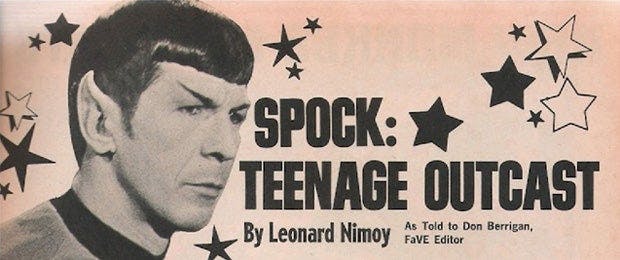
Stardate: 032515.1. Tomorrow would have been Leonard Nimoy’s 84th birthday, and this piece, which passes along crucial life lessons in Mr. Nimoy’s own words, is in tribute to him.
There are many reasons why Mr. Nimoy was well-loved and that his memory will live on. We revere and respect him as a man who cared about important issues, onscreen and off. We hold him in our hearts and minds as an actor, a director, a writer, a photographer, a husband and father, and as the face of one of the most important credos the world has ever seen: “Live Long and Prosper.”
The memories I have of Mr. Nimoy are treasured ones from backstage at conventions and a dinner with him in Tulsa. He was always kind, and he was especially attentive to social problems and human rights issues. Whenever I asked for his autograph for the non-profits my fanclub supports, he would ask about the cause and give it gladly.
Anyone who knew Mr. Nimoy has these same type of stories to tell. For me, one particular story I’ve heard stands out among many. It began 37 years ago, during the filming of The Original Series, amidst the unfortunately necessary turbulence of the Civil Rights Movement. But it is as timely today as it was then.
In 1968, a bi-racial girl in Los Angeles known only as F.C. wrote a letter to Spock, care of the then-popular Fave Magazine (now defunct). The girl had been bullied because she was half black and half white; she felt she didn’t fit in anywhere. F.C. addressed her letter directly to Spock because he was half Vulcan and half human, and had also suffered bullying. She sadly assumed she would never have any friends. Haven’t so many of us felt the aloneness than comes with being unique?
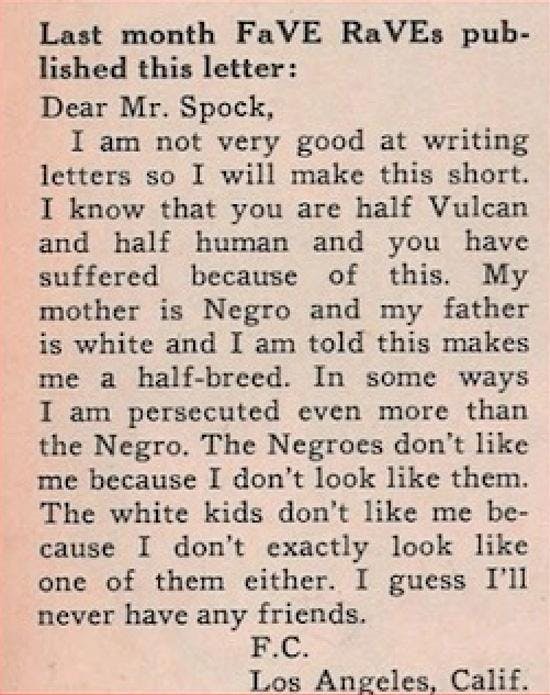
Compassionately, Mr. Nimoy decided to answer (of course, this was the right thing to do, but not everyone does the right thing—especially busy actors). Wisely, like the allegories of Star Trek, his story of how Spock dealt with being bullied and outcast were a compelling parallel to real life for the girl, and they became a way for her to find hope and freedom.
F.C’s letter and Leonard’s answer ran in Fave, where he insightfully wrote of Spock, “He was very lonely and no one understood him. And Spock was heartbroken because he wasn’t popular. But it was only the need for popularity that was ruining Spock’s happiness. The question was: which was more important, being ‘popular’ with the pack who might turn against him at any minute or being true to himself?”
And then, Mr. Nimoy spoke of a dynamic that we see too often today: “There’s a little voice inside each of us that tells us when we’re not being true to ourselves. We should listen to this voice. Often we try to talk ourselves into believing our actions are good—‘it’s OK to pick on that person,’ we say because it may make us popular for awhile with the pack.”
We face the same problems today, where differences are unfortunately still not always lauded as a good thing. There are actually still countless stories of kids (particularly girls) being bullied for loving Star Trek, Star Wars, and superheroes; Bronies are often horribly taunted, and stories of suicides of LGBT youth are frequent and heartbreaking. While the world says that we celebrate diversity, we are in the middle of another civil rights movement, due to the fact that tragic events in Ferguson, New York, Chicago, Los Angeles, Madison, and many other cities are finally making headlines. Adults make comments at home attacking others for having different religious beliefs, or physical looks, or taste in clothing, etc.—and the trickle-down effect is that kids then feel it’s OK to bully each other at school or online for being different.
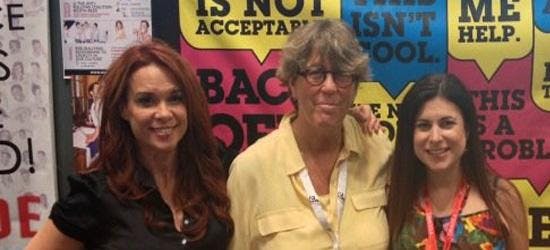
In 2013, I founded the Pop Culture Anti-Bullying Coalition with expert Carrie Goldman, and we’re doing groundbreaking work in bringing the first-ever anti-bullying program to comic-cons. It’s exciting to see how this effort has snowballed into help for countless kids and adults, and helped us to bring healing to bullying incidents, both current and long-ago.Mr. Nimoy went on to say, “Spock learned he could save himself from letting prejudice get him down by really understanding himself and knowing his own value as a person. He found he was equal to anyone who might try to put him down—equal in his own unique way. You can do this too, if you realize the difference between popularity and true greatness. It has been said that ‘popularity’ is merely the crumbs of greatness.”
I love that. “Popularity is merely the crumbs of greatness.” What’s it all about? IMO, the answer to that is in the title to the Deep Space Nine series finale: “What You Leave Behind.” We live in an era when so much time, and heart, and energy is spent on how many social media followers one has, or on how many retweets and shares our posts get. Despite the fact that studies like this one on social media obsession have been made and widely circulated, our obsession with popularity is at an all-time high. But think on these next words from Mr. Nimoy to F.C. in 1968:
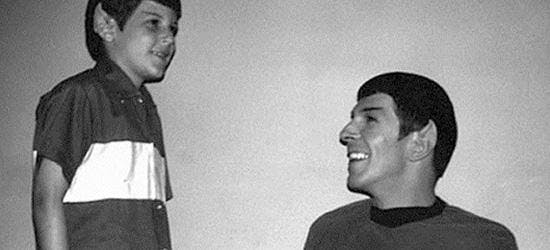
“When you think of people who are truly great and who have improved the world, you can see that they are people who have realized they didn’t need popularity because they knew they had something special to offer the world, no matter how small that offering seemed. And they offered it with peace and love. It’s all in having the patience to find out what you yourself have to offer the world that’s uniquely yours.”
Mr. Nimoy went on to write that overcoming the need to be popular lies “in choosing your own personal goal and going after it, regardless of what the others are saying. If you do this, then the ones who accept people for the right reasons—for their true worth—will find you and like you.”
Do you hear that? They will find you. And like you. All you have to do is be you, find a worthy goal, something to contribute to the world, and go after it. Have patience and offer the world what is uniquely yours. Don’t worry about the size of your audience. Just concern yourself with making a difference in the world. Then work in excellence, in intelligence, with fervor and discipline. Work in peace and love. Here’s more:
“He decided to listen to that little voice inside him and not to the people around him. He replaced the idea of wanting to be liked with the idea of becoming accomplished. Instead of being interested in being popular, he became interested in being intelligent. And instead of wanting to be powerful, he became interested in being useful.
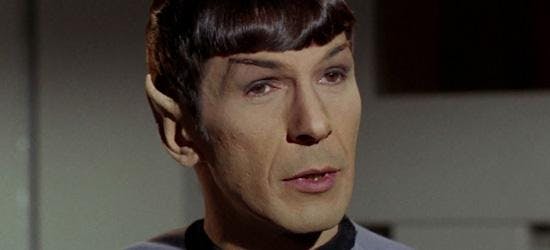
“He said to himself, ‘Not everyone will like me. But there will be those who will accept me just for what I am. I will develop myself to such a point of excellence, intelligence, and brilliance that I can see through any problem and deal with any crisis. I will become such a master of my own abilities and career that there will be a be a place for me... And that’s just what he did. And when I see him standing there on the bridge of the Enterprise, facing danger and life-and-death problems so cooly and with so much intelligence, I’m sure he made the right decision.”
Indeed. We love our heroes, because they do what we hope we would do under similar circumstances. We are called to do great things, just as they are. In Campbell-ian fashion, this is our own “hero’s journey.” What do we do when we hear the call?
In the weeks to come, I’ll have more posts here on Star Trek: In Real Life. I hope you’ll join us. In the meantime, Live Long and Prosper.
And Happy Birthday, Mr. Nimoy. Thank you, truly, for what you left behind.
______
A fan favorite worldwide, Chase Masterson is best known to the Trek world for her break-out role as Dabo Girl Leeta on Star Trek: Deep Space Nine. She has most recently been seen guest starring on CW’s The Flash. Masterson has the title role in the Doctor Who Big Finish spin-off, VIENNA, now in Season 3. She was listed in AOL’s 10 Sexiest Aliens in TV History and has worked opposite many of sci-fi’s popular leading actors, including Bruce Campbell, Jerry O’Connell and Jesse L. Martin. In 2013, Masterson founded the Pop Culture Anti-Bullying Coalition. Follow Masterson on Twitter at @ChaseMasterson and on Facebook at https://www.facebook.com/chasemastersonpage.

